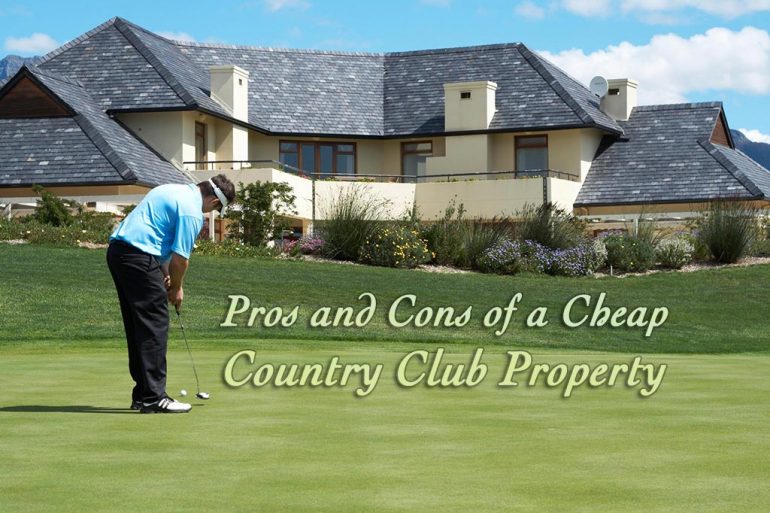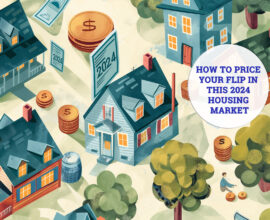Country Club Properties are Often Cheap for a Reason
While perusing Florida real estate listings, you stumble on an attractive house or condo connected to a golf course. The best part is the price. One whole dollar. Of course, you realize there’s a catch.
The fine print? The buyer must also purchase a membership at the country club, which runs $70,000. Still, even with the added expense, it’s comparable to similar non-country club properties. Is it a good investment? Country club properties are a mystery to most.
How Golf Impacts Country Club Properties
Florida is the golf course champ with more than 1,100 statewide. Unfortunately, the sport peaked around 1990. Golf has been shedding players since heavy metal and VCRs were a thing and dial-up internet was future tech.
Reporting on a 2010 study by the National Golf Foundation (NGF), the Biscayne Times pointed out that, across the country, between 500 and 1,000 public courses were expected to close within the next five years. This includes many country clubs where low-cost condos are currently for sale.
Savvy investors uncover opportunity in overbuilt sectors — you could find a gem hidden within shards of shattered glass. Just be prepared. You may have to hold on to country club properties while incurring costs that wouldn’t be a factor with other properties.
There is some good news. In 2016, “the number of beginning golfers grew to 2.5 million, a nearly 14% increase over 2015,″ said Golf Digest in an article on a recent NGF report. They continued, saying “That number is an all-time high, breaking the previous mark of 2.4 million set in 2000, when Woods was at rapid ascent.”
The takeaway is that, should you uncover a gem of a property, you may be able to turn a profit. Just make sure you know the pros and cons before you commit.
The Advantages of Buying a Country Club Condo
You Have an Inside Track
Do you have a regular tee time? Have you won a few doubles competitions? Did you sign for your lunch? If you answered yes to any of these, you have an advantage.
Florida real estate is competitive. If you already enjoy the country club lifestyle, research the sector. Expand your social circle. Talk to other club members. Even better, visit different clubs. You’ll learn about properties that are about to be listed and the hidden problems of the ones already on the market. You’ll discover which clubs are considering discounts and which ones retain most of their initiation fee after resale.
Visiting other clubs will give you a clear idea of their attractions. Check for whether the course is well-tended and what other desirable amenities are offered. You may even meet an owner who is considering selling. If you’re in a solid cash position, this could be a great opportunity.
Sector Losses Affect Everyone
As a sector, Florida golf courses are in decline. In 2015, 16 of Florida’s 1,029 golf courses closed and four opened, according to the NGF. Sector declines even impact top-notch properties. This gives you a buying opportunity.
Remember, all things being equal, you want to find the best club property available in your price range.
Development Potential
Not every golf course stays a golf course. South Florida golf courses are increasingly being transformed into housing developments. Recently, a developer proposed turning the 140-acre course at Margate’s Carolina Club into a housing tract with 350 single-family homes and townhouses.
For longtime owners, this shift is traumatic. They’ve lost more than the links — they’ve lost a view. With the exception of oceanfront homes, most properties in South Florida offer a panorama of the street and neighbors’ yards. Green space is rare.
Carolina Club homeowner James Weishar often sees strangers in his backyard photographing sunsets he calls spectacular. He told the Sun Sentinel, “I’m not very happy. The traffic flow is going to be a disaster. It’s going to be a mess.”
For you, the transformation of the back nine into single-family dwellings represents opportunity. Those longtime condo owners may be motivated sellers. Purchasing an older condo and investing in some interior remodeling and exterior TLC could pay dividends. Pricing at less than the new homes could offer potential buyers an attractive alternative.
There Are Disadvantages, Too
Risky Return on Investment
You can see why a remodeled kitchen offers one of the best ROIs. When potential buyers tour the home, it doesn’t matter if they’re more Chef Boyardee than Chef Bourdain. Faced with spanking-new cabinets and appliances, they quickly conjure visions of the creative cuisines they’ll soon craft.
Pool installations are slightly less risky in the Sunshine State, but they are still low on any ROI list. Watery holes in the ground alienate buyers who don’t want to deal with the maintenance costs.
It’s easy to see how forking out thousands of dollars for a club membership impacts your bottom line. For one, you’ve limited your potential market. Even seasoned golfers may balk at the expense while dedicated hackers understand that a low-cost condo with a high-cost club membership translates into crowded links.
It’s possible to sell a non-golfer on the other amenities or even the pretty view, but most buyers won’t want the cost. Plus, there’s the ever-present risk of an errant ball clipping your window.
Associated Costs
It’s never a good idea to count on reselling a property quickly. Being prepared means knowing how much you will have to cover each month. A country club condo means you’ll be adding membership fees to the usual HOA costs along with debt service, homeowners insurance, utilities, and property taxes.
Don’t forget other costs like community development district (CDD) fees, annual food and beverage minimums, annual trail fees (if you own your own cart), and special assessments.
Immediate Loss
Just as new cars depreciate the moment you drive them off the lot, country club condo buyers take an immediate hit. Initiation fees are often only partially refundable at resale.
For example, at Akoya at Boca West, anyone who buys a home or condo has to pay a one-time initiation fee of $70,000, with only 20% refundable when it comes time to sell. In addition, social dues total about $1,000 a month.
“The non-ocean views are not as big of a problem as the membership fees and the club dues,” said Jack Winston of Goodkin Consulting in Miami, whose firm advised Akoya’s developer. He continued, saying “Boca is a very desirable place to live, but the buyer profile for that type of development has definitely shrunk.”
At prices topping $3 million, the homes at Boca West are out of the price range of most buyers. But even lower-cost homes at golf communities come with hefty membership fees. This is why a unit at the Boca Grove Plantation was advertised as costing one dollar — the associated club had a mandatory $70,000 membership fee.
Rental Rules
One consistent strategy is renting out your country club properties while waiting for your investment to appreciate, but renting a country club condo comes with complications. Just as in other developments, there may be restrictions on non-owner-occupied dwellings.
Additionally, you have to address membership issues. The membership you received at the time of purchase may not transfer to your tenants. Count on additional fees once you land a tenant.
Cash Only
Discovering a condo that costs a few thousand or even just a few dollars might seem like winning the lottery. And if you are a cash buyer, it could be. But while you can find financing for an investment property, you can’t get a loan for the $70,000 membership.
“You can’t finance that,” said Henry L. Kaplan, sales manager at Century 21 Tenace Realty. “You have to pay cash.”
Country Clubs Are Not the Best Place to Start
If owning Florida real estate or even a low-cost condo is your goal, those bargain country club properties may not be a bargain after all. Flipping a property that has gone unsold for months despite being cheaper than a pack of gum will be a challenge. Before you consider it, get the facts.
Talk to others who’ve already made this type of investment. Don’t just listen to the sales agents. And keep perusing real estate sites like PropertyOnion.com, where you can find a comprehensive database of off-market properties that are in foreclosure, tax deed sale, HUD, wholesale, or for sale by owner.








